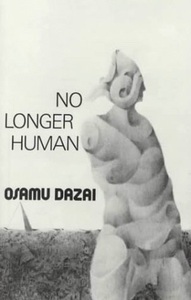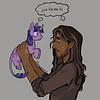Take a photo of a barcode or cover
dark
emotional
sad
tense
medium-paced
Plot or Character Driven:
Character
Strong character development:
Complicated
Loveable characters:
No
Diverse cast of characters:
No
Flaws of characters a main focus:
Yes
Graphic: Alcoholism, Drug abuse, Suicide attempt
نه آدمی، داستانی بود درباره انسانی ضعیف و بدون کمک.
این ضعیف بودن لزوما تقصیر خودش نبوده. تقصیر اتفاقات و شرایط و شانس بوده.
شانس بدش، از این بوده که با روحیه ضعیفی بدنیا اومده، با روحیه سوال کننده و ترسان. مثل خیلی از ما. این انسان ضعیف در آسایش عنان از کف می ده و در سختی به مرگ و احتمالاتش فکر میکنه. ولی اگر قوی و کله شق و بدون تردید بود...
شرایطش هم بد بوده. اینکه کسی رو نداشته که به زندگی زنجیرش کنه. که اونقدر مهم و تاثیر گذار باشه که مثل لنگر عمل کنه براش به خشکی. شاید اگه همچین آدمی رو داشت، نهآدم نمیشد.
بین جمله های کتاب خیلی همذات پنداری درم ایجاد شد. مخصوصا جمله های "دفتر نخست" که درباره کودکی و نوجوانیش بود.
پیش به سوی انیمش.
شاید براتون جالب باشه، که تو کتاب به خیام و یه شعرش اشاره شده بود. نمیدونم کار مترجم بوده یا واقعا تو متن اصلی بوده... ولی هست.
این ضعیف بودن لزوما تقصیر خودش نبوده. تقصیر اتفاقات و شرایط و شانس بوده.
شانس بدش، از این بوده که با روحیه ضعیفی بدنیا اومده، با روحیه سوال کننده و ترسان. مثل خیلی از ما. این انسان ضعیف در آسایش عنان از کف می ده و در سختی به مرگ و احتمالاتش فکر میکنه. ولی اگر قوی و کله شق و بدون تردید بود...
شرایطش هم بد بوده. اینکه کسی رو نداشته که به زندگی زنجیرش کنه. که اونقدر مهم و تاثیر گذار باشه که مثل لنگر عمل کنه براش به خشکی. شاید اگه همچین آدمی رو داشت، نهآدم نمیشد.
بین جمله های کتاب خیلی همذات پنداری درم ایجاد شد. مخصوصا جمله های "دفتر نخست" که درباره کودکی و نوجوانیش بود.
پیش به سوی انیمش.
شاید براتون جالب باشه، که تو کتاب به خیام و یه شعرش اشاره شده بود. نمیدونم کار مترجم بوده یا واقعا تو متن اصلی بوده... ولی هست.
dark
emotional
reflective
slow-paced
Plot or Character Driven:
Character
Strong character development:
Yes
Loveable characters:
No
Diverse cast of characters:
No
Flaws of characters a main focus:
Yes
dark
emotional
sad
fast-paced
Plot or Character Driven:
Character
Strong character development:
Complicated
Loveable characters:
Complicated
Diverse cast of characters:
Complicated
Flaws of characters a main focus:
Yes
dark
emotional
funny
reflective
sad
fast-paced
Plot or Character Driven:
Character
Strong character development:
Complicated
Loveable characters:
Complicated
Diverse cast of characters:
N/A
Flaws of characters a main focus:
Yes
dark
emotional
reflective
fast-paced
Plot or Character Driven:
Character
Strong character development:
No
Loveable characters:
No
Diverse cast of characters:
No
Flaws of characters a main focus:
Yes
Good read but the main character is such a whiner. Clearly has some mental health issues but so many things I feel could have gone differently if he’d given his damn head a shake
dark
emotional
medium-paced
dark
reflective
sad
medium-paced
Plot or Character Driven:
Character
Strong character development:
Complicated
Loveable characters:
No
Diverse cast of characters:
No
Flaws of characters a main focus:
Yes
per essere un'opera così acclamata diciamo che per riassumerla basta "gli umani fanno schifo, i'm so different, i'm so depressed, voglio morire, le donne sono solo oggetti da usare per il mio piacere"
non fa schifo ma non è nemmeno tutta questa gran cosa, i monologhi di Yozo sembrano usciti da r/im14andthisisdeep
penso che anche la traduzione che ho letto incida nella recensione, dato che a tratti era quasi incomprensibile ed ero tipo "che cosa sto leggendo"
non fa schifo ma non è nemmeno tutta questa gran cosa, i monologhi di Yozo sembrano usciti da r/im14andthisisdeep
penso che anche la traduzione che ho letto incida nella recensione, dato che a tratti era quasi incomprensibile ed ero tipo "che cosa sto leggendo"
my first Dazai book, and an extremely interesting introduction into his work. a beautiful, caustic semi-fictionalized autobiography of Dazai’s life (right?), using themes of masculinity, depression, and societal malaise as framing devices.
Dazai gets right into the action, detailing him youth as a “clown”, playing a bit to get others to like him while being unable to connect with his peers. this evolves into an apathetic, boozy, adventurous teenager (aren’t we all) that is simply floating from event to event without any friends, direction, or motive. after multiple failed suicide attempts, failed relationships, and not a single friend, Dazai ends up going from mental institution to a small, run down house away from modern society; in his eyes, an outcast.
through his hardships, Dazai details apathy and depression in a universal, beautiful way - the cadence and locution Dazai employs reads as both prententious, that of a Communist club attending youth, and almost jovial in it’s starkness, that of a clown putting on a show for an audience. with a unique tone, Dazai intimately describes his inner machinations and why he doesn’t feel human; his inability to process emotions like his peers, inability to understand the unnecessary guises and personas people in Tokyo are so keen to wear… it depresses him.
despite the beauty of the writing, and the power of the themes and narrative - ultimately, Dazai’s reasons for this overwhelming, all encompassing depression feel a bit sparse. he’s disillusioned and… that’s about it. it works narratively in it’s universality, but I personally found Dazai’s life shattering depression to be a bit baseless. As an autobiography, I understand that it’s not necessarily *okay* to judge the roots of ones’ depressions, so my viewpoint hits some murky water, but nonetheless - a bit underwhelmed that a well off, monthly allowance, well liked adult could do nothing but drink and draw comics and be this depressed without more foundation than just “feeling different”.
the baselessness of Dazai’s depression is wildly overshadowed by his willingness to expound on what he is feeling vs. why he is feeling it; his inner dialogues often evoke a small animal on the verge of being ensnared, it’s heart frantically pounding and it quickly navigates obstacles in hopes of escaping. Dazai’s escape is nonexistant; every obstacle simply gives way to another obstacle, resulting in a deeper spiral.
No Longer Human ends aptly; Dazai is put in what I feel is his own self-assigned purgatory. unable to fornicate with “attractive women”, constantly in pain, and cut off from society and his beloved alcohol and morphine, Dazai begins writing. a special emphasis should be placed on the beautiful relationship between prologue and epilogue - a neat bow on a very depressing package, truly solidfying that Dazai’s self-image and personal views were often far from what his friends/not friends perceived him as. too little, too late
Dazai gets right into the action, detailing him youth as a “clown”, playing a bit to get others to like him while being unable to connect with his peers. this evolves into an apathetic, boozy, adventurous teenager (aren’t we all) that is simply floating from event to event without any friends, direction, or motive. after multiple failed suicide attempts, failed relationships, and not a single friend, Dazai ends up going from mental institution to a small, run down house away from modern society; in his eyes, an outcast.
through his hardships, Dazai details apathy and depression in a universal, beautiful way - the cadence and locution Dazai employs reads as both prententious, that of a Communist club attending youth, and almost jovial in it’s starkness, that of a clown putting on a show for an audience. with a unique tone, Dazai intimately describes his inner machinations and why he doesn’t feel human; his inability to process emotions like his peers, inability to understand the unnecessary guises and personas people in Tokyo are so keen to wear… it depresses him.
despite the beauty of the writing, and the power of the themes and narrative - ultimately, Dazai’s reasons for this overwhelming, all encompassing depression feel a bit sparse. he’s disillusioned and… that’s about it. it works narratively in it’s universality, but I personally found Dazai’s life shattering depression to be a bit baseless. As an autobiography, I understand that it’s not necessarily *okay* to judge the roots of ones’ depressions, so my viewpoint hits some murky water, but nonetheless - a bit underwhelmed that a well off, monthly allowance, well liked adult could do nothing but drink and draw comics and be this depressed without more foundation than just “feeling different”.
the baselessness of Dazai’s depression is wildly overshadowed by his willingness to expound on what he is feeling vs. why he is feeling it; his inner dialogues often evoke a small animal on the verge of being ensnared, it’s heart frantically pounding and it quickly navigates obstacles in hopes of escaping. Dazai’s escape is nonexistant; every obstacle simply gives way to another obstacle, resulting in a deeper spiral.
No Longer Human ends aptly; Dazai is put in what I feel is his own self-assigned purgatory. unable to fornicate with “attractive women”, constantly in pain, and cut off from society and his beloved alcohol and morphine, Dazai begins writing. a special emphasis should be placed on the beautiful relationship between prologue and epilogue - a neat bow on a very depressing package, truly solidfying that Dazai’s self-image and personal views were often far from what his friends/not friends perceived him as. too little, too late





